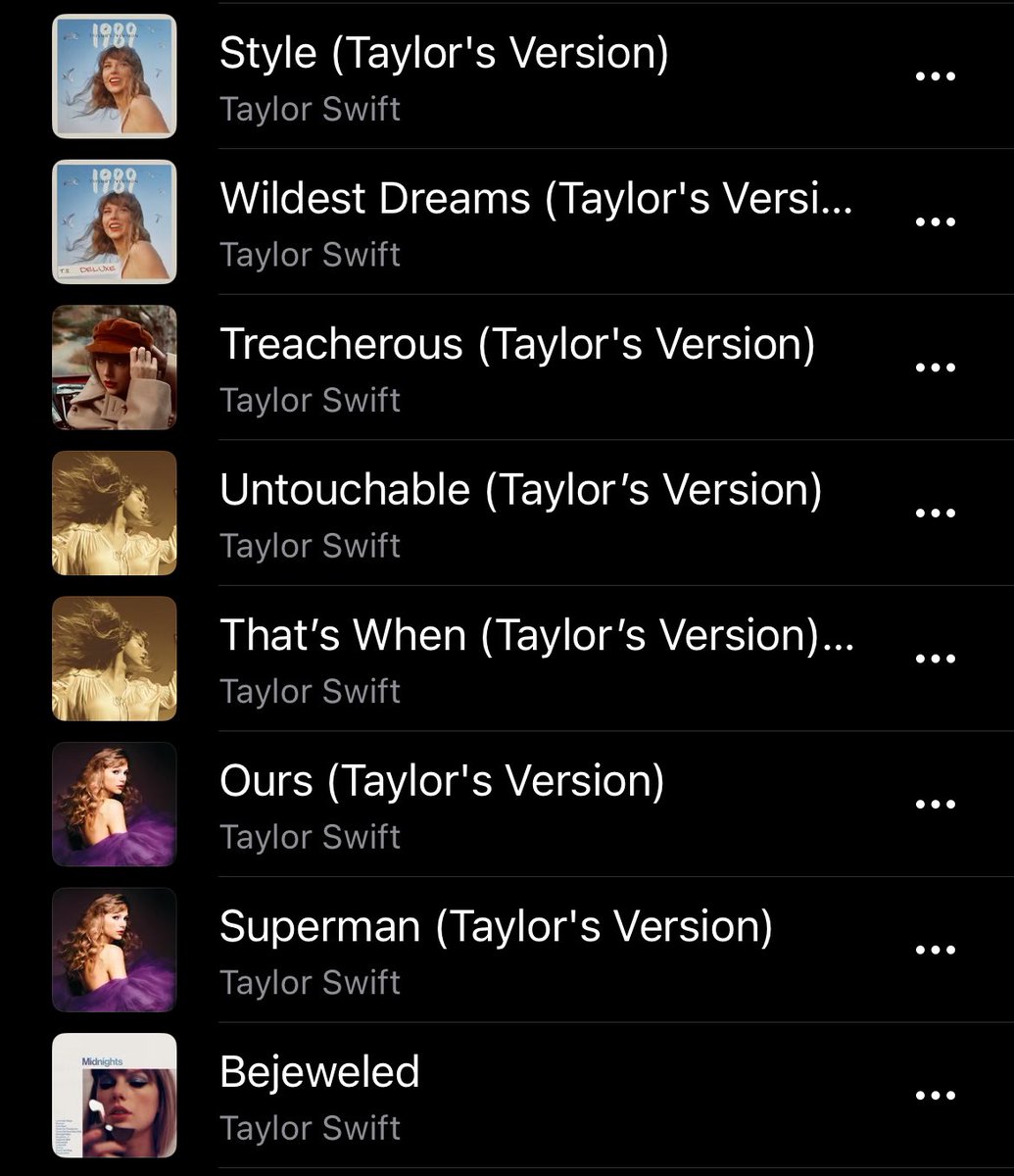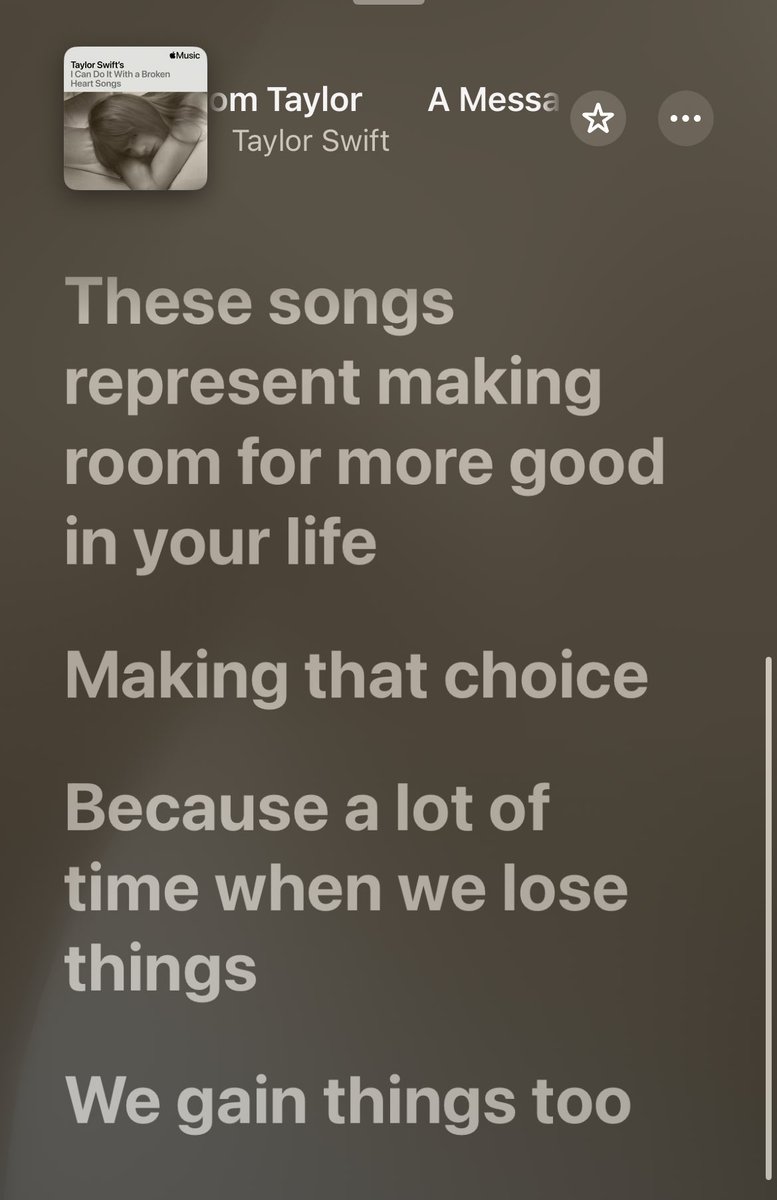ALL RIGHT I GUESS WE ARE DOING THIS.
Taylor woke up today and chose violence, so I decided to wake up and choose analysis.
Let's talk the five Stages of Grief playlists, and how they recontextualize her past discography and help us better understand the themes of TTPD.
A 🧵:
Taylor woke up today and chose violence, so I decided to wake up and choose analysis.
Let's talk the five Stages of Grief playlists, and how they recontextualize her past discography and help us better understand the themes of TTPD.
A 🧵:

1) Before I begin, THANK YOU to @contrarianshit for your thread. It is linked below!
Disclaimer: I will largely focus my analysis on tracks from the last 5 albums, as I believe the older tracks mainly serve to accentuate the themes she describes!
Disclaimer: I will largely focus my analysis on tracks from the last 5 albums, as I believe the older tracks mainly serve to accentuate the themes she describes!
https://twitter.com/contrarianshit/status/1776302467543941605?t=YzTnmHRVDmLVngZossPGWw&s=19
2) Let's begin with "I Love You, It's Ruining My Life."
This playlist represents a core theme of TTPD: denial. As Taylor once said: "the road gets hard and you get lost when you're led by blind faith." TTPD will explore her desperate attempt to resuscitate a dying relationship.


This playlist represents a core theme of TTPD: denial. As Taylor once said: "the road gets hard and you get lost when you're led by blind faith." TTPD will explore her desperate attempt to resuscitate a dying relationship.


3) The playlist tracks suggest that this period of denial spanned the entire course of the relationship, from the giddy, unstable beginnings (Cruel Summer, Snow on the Beach, Glitch) to the final, desperate justifications of years of love and loss (Sweet Nothing, Lavender Haze).




4) These tracks also suggest that the "denial and delusion" she mentions were not only regarding the long-term potential of the relationship, but also what place the relationship could take in her life. Think Willow, and her commitment to "bend right to the wind" of their love.
5) This sentiment is echoed in Bejeweled, where she reckons with the conflict between her love and her life. Perhaps she'd deluded herself into thinking that she could be content to sway in that "sweet nothing" wind, instead of swaying to her own deep need to play the mirroball.
6) I suspect that on TTPD, "But Daddy I Love Him," "Fortnight," "The Manuscript," and "loml" may explore these themes. I also wonder if "Down Bad" will straddle the line between denial and depression.
7) Now let's talk about the anger playlist: "You Don't Get To Tell Me About Sad." I believe TTPD will explore anger in many forms, from the never-closing wound of her masters ownership to her frustration with feeling held back, stifled, or gaslit in her romantic relationships.




8) The first category is well represented across many tracks, from Vigilante Shit to Mad Woman. But a more personal anger predominates, particularly around loss of innocence (WCS, Dear John) and feeling undermined and sidelined (Tolerate It, High Infidelity, Illicit Affairs).




9) I think tracks like "My Boy Only Breaks his Favorite Toys" and "The Bolter" will explore this flavor of frustration, expanding further on the sense of inequality and unfulfilment in a long-term love that she previously explored in both autobiographical and fictional form.
10) Now let's talk the "bargaining" playlist: "Am I Allowed to Cry?"
When you bargain in a relationship, it's because you already know you have to pay a price to stay. You're just desperate to negotiate that price, either by downplaying the true cost or--worse--your own worth.



When you bargain in a relationship, it's because you already know you have to pay a price to stay. You're just desperate to negotiate that price, either by downplaying the true cost or--worse--your own worth.



11) Taylor likely asks herself if she is allowed to cry because her partner doesn't give her the space to feel (or legitimize those feelings). But I also wonder if she is posing this question because she is gaslighting herself about her own needs, or the degree of her own pain.
12) The track list fuels both hypotheses. In The Great War, The Archer, and Afterglow, she is the villain of her own love story, allowing her own fears and past trauma to "blow up" her new love, as she "drinks the poison" of her own distrust alone. The key theme is self-blame.




13) But maybe blaming herself was an act of bargaining. Maybe reducing every single conflict to her own deficiencies (think: "hey, it's ALL me, in my head") was a way to bargain with herself, downplaying the severity of her partner's role or the interpersonal incongruity at play.
14) The inclusion of Peace is also very indicative of the self-blame at play, relating to the incompatibility at the heart of her relationship (between the relationship itself and her persona). But why did she never ask whether her partner could make peace with her life instead?
15) Lastly, the inclusion of Renegade is very telling. I have at MANY points discussed how I believe Renegade represented the relational conflict that fueled Midnights and TTPD (linked below). But in short, Renegade describes the act of sacrificing yourself for a troubled love.
16) In Renegade, she bargains with her own pain, subjugating herself to the service of a partner who isn't able or willing to receive her affection. No matter how many times she becomes collateral damage, she hopefully taps the window of his darkest night.
https://twitter.com/tweetsricochet/status/1758503003487604865?t=CDvUYIhKk2LwXQat8CCHxA&s=19
17) I think tracks like "The Albatross" and "The Tortured Poets Department" will explore these themes even more deeply, examining every time she allowed her hand to be squeezed just as she was about to leave, and how her empathy continually obstructed her own healing and freedom.
18) "The Alchemy," too, is an intriguing possibility, potentially concerning how her denial and bargaining conspired to manufacture a set of gold-colored glasses through which she could view the relationship with relentless, earnest optimism. A gold that never was what it seemed.
19) Now let's talk the depression playlist: "Old Habits Die Screaming." This playlist suggests that TTPD will heavily explore the ongoing grief she experienced in the impending collapse of her relationship, and how that very same depression also often paralyzed her into inaction.






20) I think on one level, she will explore the loss of the love that was dying before her (Maroon, BTTWS, YLM, CP). But even more interestingly, I think she will be grieving the shattered illusions of past relationships, as well as who she used to be before her many losses.




21) Look at MTR and Hoax, songs about reckoning with betrayal--about forever grieving the version of the traitor you once loved. Coney Island also deals heavily in the grief of seeing a person in an entirely new light, once the sun has gone down on the glory years of your love.
22) Dear Reader and RWYLM, at their core, both grieve the versions of yourself that were sacrificed to trauma. What you could have been, had you not been frozen in time, or crippled by your own mistakes. In other words, what would've been, could've been, should've been you.
23) I think TTPD will absolutely explore these themes in "The Black Dog," "So Long, London," and potentially even "Down Bad" as discussed previously. How much did this grief motivate her to seek a new life for herself--and how much did it keep her frozen in the restaurant?
24) Lastly, let's discuss the acceptance chapter: "I Can Do It With a Broken Heart." Similar to YOYOK, this TTPD theme will explore not only life after loss, but also the incredibly personal and fulfilling period of gathering strength and confidence to strike out on your own.




25) This playlist, to me, exudes both empowerment and hope. In Midnight Rain and YOYOK she leans into her achievements, learning to embody and fully OWN the "rain that's always going to come when you're standing with me." That very same rain she had previously been ashamed of.
26) This playlist also leans heavily on Taylor's eternal belief in romance--her intrinsic optimism that love will always regenerate, will always begin anew. Think Begin Again, Labyrinth, Invisible String, Daylight, or even the 1. There is always more love.
https://twitter.com/tweetsricochet/status/1722809425046458733?t=PRORORT2CMs-LMKjwRrBUA&s=19
27) The final component of acceptance is healing. You need more than confidence and hope to recover from a long-term love--you need to be able to look your own experiences boldly in the eye and see both the good AND the bad for what they truly were, with the benefit of hindsight.
28) Think Clean, Happiness, Long Story Short, August, and Evermore. These songs are all about looking "past the blood and bruise," and gleaning exactly what "pages turned and lessons learned" the relationship offered. They are about finally learning to be honest with yourself.
29) I think ICDIWABH, Florida, and Fresh Out The Slammer will deal with the complicated mix of euphoria and painful realization that accompany true acceptance. But really, acceptance isn't just a stage at the end of a clear, linear path of grief. Acceptance IS the entire process.
30) Every tear you shed, every defiant denial you uphold, every lie you tell yourself, and every smolder of rage are all part of acceptance, because they are all intertwining pieces of what it means to accept the TRUTH of any sort of pain. They all cycle and build on each other.
31) So I hope more than anything, TTPD explores not just the individual stages of grief, but the PROCESS of grieving. Of learning not just to "move on," but to move FORWARD with everything you have learned--for one, about the relationship, but more importantly, about yourself.
32) Got too excited and forgot to attach the acceptance playlist, HERE IT IS!
THANK YOU ALL FOR READING. See my megathread for more!


THANK YOU ALL FOR READING. See my megathread for more!
https://twitter.com/tweetsricochet/status/1638559366159769602?t=1OINrget1fd_SE3htbzrOA&s=19


@EthanMelone @nicole_solis_ (She says after dropping all her work to write this today)
• • •
Missing some Tweet in this thread? You can try to
force a refresh










